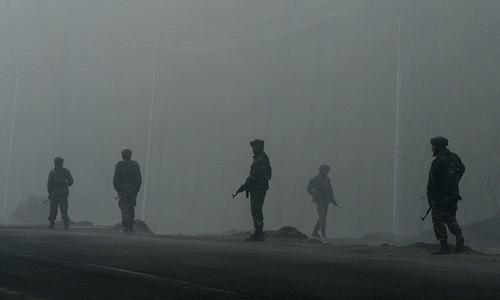GUNS BOOM AS INDIA AND PAKISTAN IN WAR RHETORIC
Tensions between India and Pakistan continue to rise as troops remain engaged along the LOC

NEW DELHI: Indian and Pakistani troops have exchanged fire at Sialkot’s Charwa sector, according to reports. No casualties were reported, with both sides accusing the other of ceasefire violations.
The exchange follows a statement by Indian Defence Minister Arun Jaitley to an Indian news channel a day ago, warning Pakistan for its “adventurism.” “Our conventional strength is far more than theirs. So if they persist with this, they'll feel the pain of this adventurism," Jaitley said.
The two sides have been caught in a cross-border exchange this month, that has killed over 20 civilians and injured dozen others, in the worst violation to date of a 2003 ceasefire.
The firing has led to a dip in relations between the two countries, with Pakistan penning a letter to UN Secretary General Ban Ki Moon that invoked the UN to implement resolutions for a plebiscite in Kashmir.
The letter marked a major reversal of Pakistan’s position for over a decade, sending bilateral relations between the two countries plummeting. India reacted to the letter on Tuesday, with Foreign Ministry spokesperson Syed Akbaruddin dismissing the role of a third party. “The road to a peaceful and co-operative relationship between India and Pakistan runs from Islamabad via Lahore to New Delhi. If you divert that road to New York or elsewhere, it will not serve any purpose, because there is no place for third party in India-Pakistan relations.”
The UN too seems to have taken a non-interventionist approach to the letter, with Ban’s deputy spokesperson Farhan Haq, when asked about the letter, referring to a previous comment by the UN Secretary General that urged India and Pakistan to resolve their differences through dialogue to constructively find a long-term solution to peace and stability in Kashmir.
The letter was a clear move to internationalise the Kashmir issue. Penned by Pakistan’s National Security Advisor Sartaj, it stated, “As you are aware, the Jammu and Kashmir dispute is one of the long outstanding issues on the agenda of the United Nations Security Council, whose resolutions promising the holding of a plebiscite, under the auspices of the United Nations, for self-determination of the people of Jammu and Kashmir, remain valid though unimplemented to date. For decades, Pakistan has been reminding the United Nations and the international community to fulfill that promise, in the interest of durable peace and security in the region.”
The two countries have been locked in a border skirmish since October 1. The ceasefire, signed in 2013, was also breached in August this year, with this round of firing following a calm September. The hostilities come on the heels of the cancellation of secretary-level talks over Pakistan’s decision to meet Kashmiri separatist leaders in August. The talks had signalled the prospect of renewed ties between the two countries, after Indian Prime Minister Narendra Modi invited Pakistani counterpart Nawaz Sharif to attend his swearing-in ceremony, with the two leaders meeting in New Delhi on the same occasion.
Speaking at the United Nations last month, Sharif said that India’s decision to cancel the talks had resulted in a “missed opportunity.” Modi, speaking at the UN the next day, responded saying that India was not opposed to talks, but would not participate “in the shadow of terror” and that it was upto Pakistan to “create a conducive atmosphere for talks.”



